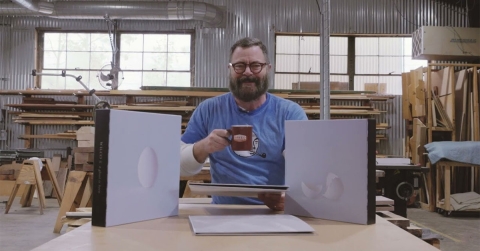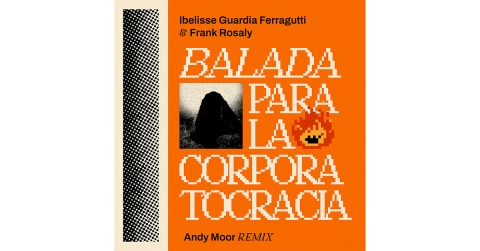Tristan Perich’s Drift Multiply, for 50 violins and 50-channel 1-bit electronics, is out now on New Amsterdam and Nonesuch Records. The piece, Perich’s largest work to date, is conducted by Douglas Perkins. Scored as one hundred individual lines of music, the piece blends violins and speakers into a cascading tapestry of tone, harmony, and noise. The violins perform from sheet music, while the speakers are each connected to custom-built circuit boards programmed to output 1-bit audio, the most basic digital waveforms made of just ones and zeroes. "Unapologetically beautiful," says The Wire. "Mesmerising," says Uncut.
Tristan Perich’s Drift Multiply, for fifty violins and fifty-channel 1-bit electronics, is out now on New Amsterdam and Nonesuch Records, as part of the partnership between the two labels, and is available here. "Perich approaches composition from an angle that sets him apart," says The Wire. "Drift Multiply is certainly alluring; it is also satisfyingly thought-provoking ... unapologetically beautiful." Uncut calls it "mesmerising."
Drift Multiply, Perich’s largest work to date, is performed by fifty violins and fifty loudspeakers and is conducted by Douglas Perkins. Scored as one hundred individual lines of music, the piece blends violins and speakers into a cascading tapestry of tone, harmony, and noise. The violins perform from sheet music, while the speakers are each connected to custom-built circuit boards programmed to output 1-bit audio, the most basic digital waveforms made of just ones and zeroes. “I am interested in the threshold between the abstract world of computation and the physical world around us,” Perich explains.
Journalist Ben Ratliff wrote, “Drift Multiply uses ingredients which have become well-known in Perich’s work: strings or one-bit tones entering a section in layers of evenly-spaced notes or drones; quickly advancing depths and densities; harmony spreading across the space of the music in flickering, cascading, or wave-like motions; white noise, rendered in pulses or fields of sound.” He continues, “Steve Reich has been a fan since hearing 1-Bit Symphony. ‘I started listening to it, and I thought, my gosh … In some ways it reminded me of [Stravinsky’s] Petrushka. Who would think of electronic chips as summoning up anything as beautiful, musically, as that?’” Drift Multiply premiered at the Cathedral of Saint John the Divine for the 2018 Red Bull Music Festival. In 2019, it traveled to the Netherlands for Big Idea #01, where Lucinda Childs was commissioned to create a new large-scale dance to Drift Multiply, performed by 66 dancers in front of the live music.
New York–based composer Tristan Perich’s work is inspired by the aesthetic simplicity of math, physics, and code. The Wire describes his compositions as “an austere meeting of electronic and organic.” 1-Bit Music, his 2004 release, was the first album ever released as a microchip, programmed to synthesize his electronic composition live. His follow-up circuit album, 1-Bit Symphony, has received critical acclaim, with the Wall Street Journal saying “its oscillations have an intense, hypnotic force and a surprising emotional depth.” The New York Times called his latest circuit album, Noise Patterns, “techno for silicon-based life forms.” As an electronic musician, he has performed internationally, from Sonár, MUTEK, and the Barbican to the National Gallery of Art and The Kitchen. As a composer, he has received commissions from Sō Percussion, the LA Philharmonic, Vicky Chow, and more, as well as an award of distinction from Ars Electronica for his work for violins and 1-bit electronics, Active Field. As a visual artist, his audio installations, video works and machine drawings have received commissions from the likes of Rhizome and L’Auditori in Barcelona, and his artwork has been exhibited internationally, including the Museum of Modern Art, VOLT Festival, the San Diego Museum, and bitforms gallery.
- Log in to post comments



